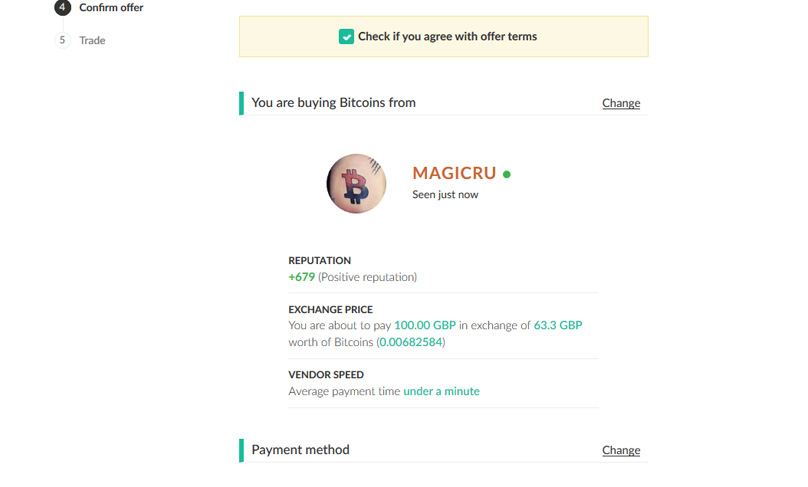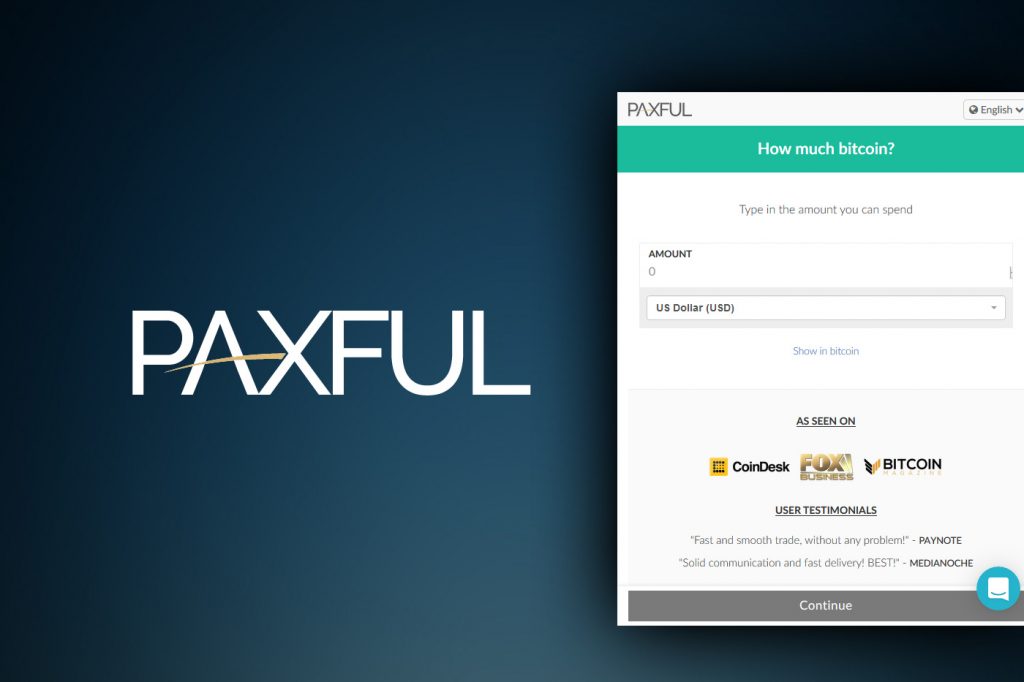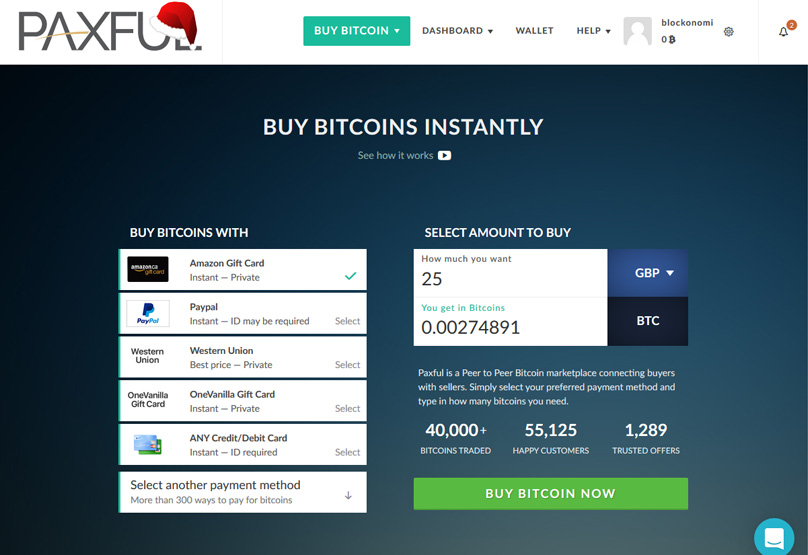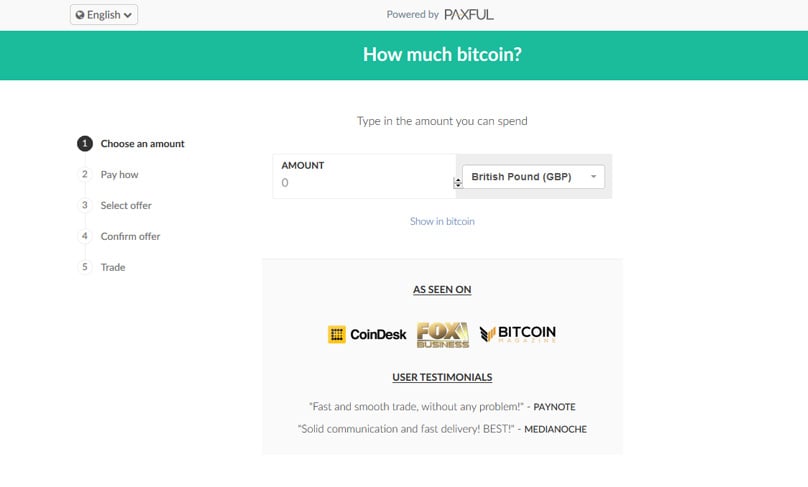The team behind Paxful Paxful's mission is to create an honest, straightforward, and secure trading environment for individuals to exchange value. It operates similarly to how sites like eBay facilitate everyday transactions but specializes in enabling Bitcoin trading through a peer-to-peer platform.
Based in the USA, Paxful was founded in 2015 by developers keen on building a marketplace where buyers and sellers could connect after creating trade offers. The platform acts as an intermediary, providing a designated space for interactions between users.
Favored for its user-friendly interface and diversity in payment methods, Paxful supports an enormous range of options for trading Bitcoin. You can choose from bank transfers, cards (both credit and debit), PayPal, MoneyGram, and Skrill. Additionally, purchases can be made using many types of gift cards, such as Amazon or iTunes, making Paxful an extremely versatile platform for Bitcoin transactions.
How it Works
Starting out on Paxful is a breeze: just visit the site and select how much Bitcoin you want to buy, as well as your preferred local currency. This will then display the equivalent amount in Bitcoin.
Once you’ve set up an account, you can hunt for Bitcoin sellers. Common filters include currency type and preferred payment methods.

Afterwards, you can peruse the available orders; there will be numerous sellers. You can identify the most fitting vendor by assessing their payment methods, order limits, and pricing. Checking out the seller's feedback and account history is also wise to ensure compatibility.
Once you’ve identified a vendor that suits your needs, begin the transaction by clicking the 'Buy' button. Then specify how much Bitcoin you wish to purchase, opening an escrow service and chat feature to allow direct communication with the seller for further trade details.

Upon completing the purchase and finalizing the payment, mark your transaction as 'Paid,' and your Bitcoin will soon be transferred into your Paxful wallet. Once this is done, your Bitcoin is ready for use however you see fit.
Visitors without an account still have an avenue to make purchases. After selecting the desired currency and amount, they follow a guided process to complete the transaction.
The process of buying Bitcoin on Paxful is straightforward, providing buyers a rich array of payment choices. Although Paxful doesn't impose fees directly on buyers, sellers set their own fees, which can vary significantly depending on the payment method used. Purchases made with gift cards often incur higher fees.
The sellers incur a 1% charge, and there's also a 'mining fee' for transferring Bitcoin from one address to another. Like Localbitcoins, Paxful is a peer-to-peer marketplace that incorporates essential features to uphold a high user experience.
Key Features
Paxful offers an impressive selection of payment methods for transactions, including:
- Cash Deposits
- Credit and Debit Cards
- Gift Cards
- MoneyGram
- National Bank Transfer
- PayPal
- Western Union
To protect trades, Paxful has implemented several security measures:
- Fund Safety – Upon creating an account, Paxful provides a wallet to safely store and transfer your funds. The platform's servers are aligned with top-tier banking standards.
- Two-Factor Authentication – Secure your wallet with strong passwords and two-factor authentication. Activating 2FA enhances your protection against unauthorized access.
- Escrow Service – When trading, funds are held in escrow until both parties have confirmed successful transaction elements. It serves as a protection for traders and smoothens the trading process.
- Reputation Ratings – Traders get ranked based on feedback and trading activity, with profiles available for public viewing.
- Customer Support – With a robust support system, Paxful's team strives to address user concerns swiftly. Users can reach out through various channels, including direct messaging, email, phone, and social media.
Although Paxful maintains competitive low fees, akin to Localbitcoins, sellers set higher prices than centralized exchanges. Peer-to-peer platforms allow vendors to monetize by slightly hiking prices, mainly to avoid losses from chargeback-prone payment methods like credit cards and PayPal.
Things to Consider
Operating as a decentralized exchange, Paxful encourages users to adopt safety practices to ensure a smooth experience. Despite being recognized as a reputable source for Bitcoin transactions, its diverse payment options attract potential scammers. Caution is advised to:
- Review seller profiles and verify reliability factors. Opt for experienced vendors with high ratings, preferably with over a year's account history and at least a 98% positive score.
- Initiate exchanges via the platform; avoid external trades which can bypass escrow protections. Stick to Paxful's messaging system for communication rather than external channels.
- Detail your requirements and highlight significant conditions. Prices vary with payment methods, so secure a suitable price agreement.
- Select secure payment methods. Gift cards paid with cash are scam-prone due to their untraceability, whereas credit cards, PayPal, or bank transfers offer added security.
- If facing complications or queries about sellers, reach out to customer support or use the forum. Utilize the available resources, as the process, while straightforward, can pose challenges.
Paxful offers one of the simplest pathways to acquiring Bitcoin, welcoming anyone with internet access to trade. With no purchase or sale caps, users control the level of identification verification used in transactions. Plus, it offers the broadest selection of payment methods.
Paxful's appeal largely lies in its flexible payment variety. Users should constantly be wary of those intending to exploit legitimate traders. This is a significant downside, although Paxful helps mitigate this by offering strong customer support, resources, and forum updates to aid users.
For those connecting Bitcoin trades with services like PayPal, MoneyGram, and Skrill, Paxful stands as a top choice. Its unparalleled flexibility in payment methods does demand higher prices, as vendors escalate rates compared to traditional exchanges.
Paxful remains a favored medium for Bitcoin trading within the crypto community. It presents new and seasoned traders with purchase opportunities otherwise unavailable. Nevertheless, users should engage with due diligence, verifying sellers and securing their dealings.









12Comments
Why you should never use Paxful.
As a Paxful vendor for 8 months, today's the day I decided to part ways with the platform. I've dealt with ongoing issues expecting improvements, but disappointingly, things have only deteriorated.
In conclusion, Paxful committed three significant mistakes that lead me to advise against using it.
1. Paxful never distributed BCH, BTG, or any forked coins to users, keeping them instead for profit—I've evidence that they capitalized massively from these coins. Check for yourself by entering your Paxful wallet number in a BCH explorer.
2. Over the years, there have been fraudulent networks thriving on their site, and Paxful seems to back them up for reasons I can only guess at. These networks display distinctive patterns and behaviors that anyone could spot in a heartbeat. Why they remain unchecked is baffling, yet I suspect there might be financial benefits tied to them.
3. It looks like Paxful turns a blind eye to all the rational regulations such as KYC, paving the way for the exploitation of stolen credit cards, compromised PayPal accounts, and misappropriated gift cards. Reporting such incidents to their biased moderators often results in harsh treatment unless you've managed to gather a band of vendors to support your claim.
Overall, this company appears to be leaderless, operated by a clueless team. Their interface is appealing to me, but it's merely a facade for marketing deceit. Their latest endeavors are cloaked under a mere fraction of the funds they illicitly acquired from unsuspecting users.
More details and proof will follow.
It's amusing how I keep encountering this widely circulated, yet there’s never any follow-up with proof or details.
I was conned by a seller named Kcano, who boasted an impeccable reputation, so I trusted her. I sent $240 via PayPal at her suggestion to use friends and family. If you transfer money this way, PayPal won’t refund you if things go sideways. After receiving my money, she instructed me to cancel the trade, promising to reopen it. Canceling a trade is a trap; I tried contacting Paxful multiple times to no avail. Their customer support is non-existent. Never cancel a trade after making payment—learn from my mistake. I've reached out to the trader Kcano repeatedly with messages, and she finds amusement in having scammed me. I’d love to confront her in person!
I'd actually endorse Paxful. I've done several deals there, and once I got scammed, but I immediately reached out to their support through live chat. It took a few days, but eventually, I reclaimed my bitcoins, and the scammer was banned. Kudos to the support team for their effort.
How did you find out that the person's profile was banned? Does Paxful disclose confidential client information?
Actually, you can view the URLs of users you’ve transacted with, meaning profiles are public, generally structured as paxful.com/user/thispersonsusername.
This is where user reputations are displayed, including verification status, trade count, and any ongoing offers, so technically, it isn't confidential.
Being relatively new to cryptocurrencies, after seeing this post, I decided to explore them. I appreciated their interface, and it was straightforward for me to navigate. I completed my first trade seamlessly! Definitely planning to use them again. Thanks for this post, buddy!
I frequent Paxful more than once a week. The site is well-constructed; I particularly like the vast array of payment options available, which makes dealing with diverse vendors easier. Just follow the guides, and everything will go smoothly; it’s not a scam.
Certain Paxful vendors will redeem your gift card and provide an image claiming it was used before you sent it, even if you did just after peeling off the silver panel. This creates doubt that the vendor swiped your card. Yet, after opening a dispute, Paxful moderators direct you to contact your gift card provider, like Apple. However, Apple will not disclose who used the card, leaving you helpless, and Paxful may end up returning the bitcoin to the vendor who deceived you. To me, it seems Paxful aids scammers in evading accountability.
In reality, you can inquire with Apple about the redemption time to pinpoint who might have used it. Paxful supplies clear instructions for this, ensuring if you clarify your situation, Apple might assist you. The main issue lies with Apple, not Paxful.
Actually, their customer service has significantly improved! I think they announced expanding their team. It's evident in live chats with response times generally under 24 hours. I’ve even received replies in as little as 20 minutes.
What strategies can prevent a buyer from annulling the transaction when paying via PayPal?